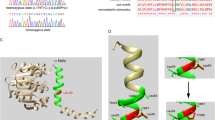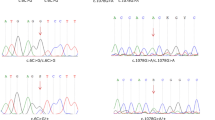Abstract
Congenital hearing impairment (HI) affects one in 1,000 newborns and has a genetic cause in 50 % of the cases. Autosomal recessive non-syndromic hearing impairment is responsible for 70–80 % of all hereditary cases of HI. Recently, it has been demonstrated that, mutations of LRTOMT are associated with profound nonsyndromic hearing impairment at the DFNB63 locus. The objective of this study is to evaluate the carrier frequency of c.242G>A mutation in LRTOMT gene and define the contribution of this gene in the etiology of deafness in Moroccan population. We screened 105 unrelated Moroccan families with non-syndromic HI and 120 control individuals for mutation in the exon 8 of the LRTOMT gene, by sequencing and PCR-RFLP. The Homozygous c.242G>A mutation was found in 8.75 % of the families tested and in 4.16 % of control in the heterozygous state. Our results show that after the GJB2 gene mutation in LRTOMT gene is the second cause of congenital hearing impairment in Moroccan patients. This finding should facilitate diagnosis of congenital deafness of the affected subjects in Morocco.



Similar content being viewed by others

References
Schulze JM (2009) LRTOMT: a new tone in understanding the symphony of non-syndromic deafness. Clin Genet 75:227–229
Friedman TB, Griffith AJ (2003) Human nonsyndromic sensorineural deafness. Annu Rev Genomics Hum Genet 4:341–402
Van Camp G, Smith RJ (2011) Hereditary hearing loss homepage. http://hereditaryhearingloss.org/
Tlili A, Masmoudi S, Dhouib H, Bouaziz S, Rebeh IB, Chouchen J et al (2007) Localization of a novel autosomal recessive non-syndromic hearing impairment locus DFNB63 to chromosome 11q13.3-q13.4. Ann Hum Genet 71:271–275
Kalay E, Caylan R, Kiroglu AF, Yasar T, Collin RW, Heister JG et al (2007) A novel locus for autosomal recessive nonsyndromic hearing impairment, DFNB63, maps to chromosome 11q13.2-q13.4. J Mol Med 85:397–404
Khan SY, Riazuddin S, Tariq M, Anwar S, Shabbir MI, Riazuddin SA et al (2007) Autosomal recessive nonsyndromic deafness locus DFNB63 at chromosome 11q13.2-q13.3. Hum Genet 120:789–793
Ahmed ZM, Masmoudi S, Kalay E, Belyantseva IA, Mosrati MA, Collin RW et al (2008) Mutations of LRTOMT, a fusion gene with alternative reading frames, cause nonsyndromic deafness in humans. Nat Genet 40:1335–1340
Du X, Schwander M, Moresco EM, Viviani P, Haller C, Hildebrand MS et al (2008) A catechol-o-methyltransferase that is essential for auditory function in mice and humans. Proc Natl Acad Sci USA 105:14609–14614
Bonifácio MJ, Archer M, Rodrigues ML, Matias PM, Learmonth DA, Carrondo MA, Soares-Da-Silva P (2002) Kinetics and crystal structure of catechol-o-methyltransferase complex with co-substrate and a novel inhibitor with potential therapeutic application. Mol Pharmacol 62:795–805
Tunbridge EM, Harrison PJ, Weinberger DR (2006) Catechol-o-methyltransferase, cognition, and psychosis: Val158Met and beyond. Biol Psychiatry 60:141–151
Abidi O, Boulouiz R, Nahili H, Ridal M, Alami MN, Tlili A, Rouba H, Masmoudi S, Chafik A, Hassar M, Barakat A (2007) GJB2 (connexin 26) gene mutations in Moroccan patients with autosomal recessive non-syndromic hearing loss and carrier frequency of the common GJB2-35delG mutation. Int J Pediatr Otorhinolaryngol 71:1239–1245
Abidi O, Boulouiz R, Nahili H, Bakhouch K, Wakrim L, Rouba H, Chafik A, Hassar M, Barakat A (2008) Carrier frequencies of mutations/polymorphisms in the connexion 26 gene (GJB2) in the Moroccan population. Genet Test 12:569–574
Abidi O, Boulouiz R, Nahili H, Nourlil J, Hassar M, Chafik A, Barakat A (2008) The analysis of three markers flanking GJB2 gene suggests a single origin of the most common 35delG mutation in the Moroccan population. Biochem Biophys Res Commun 377:971–974
Nahili H, Ridal M, Boulouiz R, Abidi O, Imken L, Rouba H, Alami MN, Chafik A, Hassar M, Barakat A (2008) Absence of GJB3 and GJB6 mutations in Moroccan familial and sporadic patients with autosomal recessive non-syndromic deafness. Int J Pediatr Otorhinolaryngol 72:1633–1636
Nahili H, Charif M, Boulouiz R, bounaceur S, Benrahma H, Abidi O, Chafik A, Rouba H, Kandil M, Barakat A (2010) Prevalence of the mitochondrial A1555G mutation in Moroccan patients with non-syndromic hearing loss. Int J Pediatr Otorhinolaryngol 74(9):1071–1074
Boulouiz R, Li Y, Soualhine H, Chafik A, Nürnberg G, Becker C, Nürnberg P, Kubisch C, Wollnik B, Barakat A (2008) A novel mutation in the espin gene causes autosomal recessive non-syndromic hearing loss but no vestibular dysfunction in a Moroccan family. Am J Med Genet A 146A:3086–3089
Li Y, Pohl E, Boulouiz R, Schraders M, Nurnberg G, Charif M, Admiraal RJC, Ameln Sv, Baessmann I, Kandil M, Veltman JA, Nurnberg P, Kubisch C, Barakat A, Kremer H, Wollnik B (2010) Mutations in TPRN cause a progressive form of autosomal-recessive nonsyndromic hearing loss. Am J Hum Genet 10:1016
Charif M, Abidi O, Boulouiz R, Nahili H, Rouba H, Kandil M, Delprat B, Lenaers G, Barakat A (2012) Molecular analysis of the TMPRSS3 gene in Moroccan families with non-syndromic hearing loss. Biochem Biophys Res Commun. doi:10.1016/j.bbrc.2012.02.06
Grimberg J, Nawoschik S, Belluscio L, McKee R, Turck A, Eisenberg A (1989) A simple and efficient non-organic procedure for the isolation of genomic DNA from blood. Nucleic Acids Res 17:8390
Karayiorgou M, Morris MA, Morrow B, Shprintzeni RJ, Goldberg R, Borrowii J, Gost A, Nestadt G, Wolyniec PS et al (1995) Schizophrenia susceptibility associated with interstitial deletions of chromosome 22q11. Proc Natl Acad Sci USA 92:7612–7616
Murphy KC, Jones LA, Owen MJ (1999) High rates of schizophrenia in adults with velo-cardio-facial syndrome. Arch Gen Psychiatry 56:940–945
Vanwesemael M, Schrauwen I, Ceuppens R, Alasti F, Jorssen E, Farrokhi E, Chaleshtori MH, Van Camp G (2011) A 1 bp deletion in the dual reading frame deafness gene LRTOMT causes a frameshift from the first into the second reading frame. Am J Med Genet A 155A(8):2021–2023
Bordo D, Argos P (1991) Suggestions for “safe” residue substitutions in site-directed mutagenesis. J Mol Biol 217:721–729
Acknowledgments
We would like to thank the family members for their participation and cooperation.
Author information
Authors and Affiliations
Corresponding author
Additional information
Majida Charif and Safaa Bounaceur contributed equally to this study.
Rights and permissions
About this article
Cite this article
Charif, M., Bounaceur, S., Abidi, O. et al. The c.242G>A mutation in LRTOMT gene is responsible for a high prevalence of deafness in the Moroccan population. Mol Biol Rep 39, 11011–11016 (2012). https://doi.org/10.1007/s11033-012-2003-3
Received:
Accepted:
Published:
Issue Date:
DOI: https://doi.org/10.1007/s11033-012-2003-3



